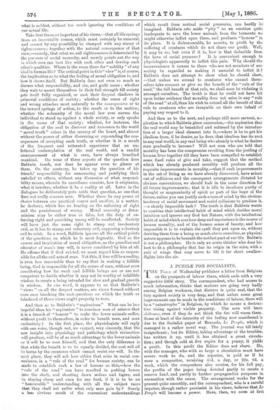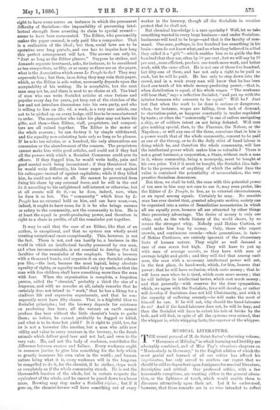A PUZZLE FOR SOCIALISTS.
Pr HE Times of Wednesday publishes a letter from Belgium on the prospects of labour there, which ends with a very suggestive little story. The correspondent, who had access to much information, thinks that matters are going very badly among Belgian workmen, that distress is quite real, that the fury against society is very deep, and that unless some great improvement can be made in the conditions of labour, there will be a " catastrophe " in Belgium, by which he means a destruc- tive rising against visible property. The men will burn cluileaux, even if they do not think the fire will warm them. Some at least of the intensity of the feeling now manifested is due to the Socialist paper of Brussels, Le Potpie, which is managed in a rather novel way. The journal was till lately insignificant ; but its Editor, taking advantage of the troubles, has written it up, until it has attained a great circula- tion ; and though sold at five copies for a penny, it yields a profit. In this profit the Editor does not share. He, with the manager, who with so large a circulation must have severe work to do, and the reporter, is paid as if he were a compositor, receiving 45d. a day, or 22s. 6d. a week, which the compositors also receive, for his full pay, the profits of the paper being devoted partly to create a reserve fund, and partly to further propagandist purposes in connection with the cause. The arrangement works for the present quite smoothly, and the correspondent, who is a careful inquirer, though rather pessimist in his views, believes that Le Peuple will become a power. Here, then, we seem at first
sight to have come across an instance in which the permanent difficulty of Socialism—the impossibility of preventing intel- lectual strength from asserting its claim to special reward— seems to have been surmounted. The Editor, who presumably makes the paper succeed, is only paid like a compositor. That is a realisation of the ideal ; but then, social laws are to be operative over long periods, and one has to inquire how long this perfect arrangement will last. The answer can only be, "Just as long as the Editor pleases." Suppose he strikes, and demands separate treatment, asks, for instance, to be considered as ten compositors, or fifty, or as many as there are on the paper, what is the Association which owns Le Peuple to do P They may supersede him ; but then, in so doing they may ruin their paper, which, as the Editor is sole writer, necessarily depends upon the acceptability of his writing. He is acceptable, but the next man may not be, and there is next to no choice at all. The kind of man who can write Socialist articles at once furious and popular every day for years, yet keep out of the clutches of the law and not introduce dissensions into his own party, and who is willing to live on 22s. 6d. a week, is a very rare article, one not to be picked up on every hedge, still less to be manufactured to order. The compositor who takes his place may not have his gifts, and then—then Editor, staff, proprietors, and composi- tors are all ruined together. The Editor is the motor of the whole concern ; he can destroy it by simple withdrawal, and the equality now subsisting lasts only as long as he pleases. If he asks ten salaries, or a hundred, the only alternatives are concession or the abandonment of the concern. The proprietors cannot make him write good articles, and could not if they had all the powers with which a Socialist Commune could arm its officers. If they flogged him, he would write badly, pain and good mental work being inconsistent ; if they threatened him, he would write differently, his inner anger going out against his colleagues instead of against capitalists ; while if they killed him, he could not write at all. He cannot be prevented from fixing his share by any external force, and he will in the end fix it according to his enlightened self-interest or otherwise, but at all events will fix it,—as he does, indeed, now, when he fixes it so low. The " community " which lives by Le Peuple has no external hold on him, and can have none,—as, indeed, it ought to have none, for it is he who brings success or safety to the community, not the community to him. He is at least the equal in profit-producing power, and therefore in right to a share in profits, of all the remainder put together.
It may be said that the case of an Editor, like that of an author, is exceptional, and that no system can wholly avoid treating exceptional cases exceptionally. This, however, is not the fact. There is not, and can hardly be, a business in the world in which an intellectual faculty possessed by one man, and often incommunicable, is not essential to develop the full faculties of the remainder of the employ6s. Take a brewery with a thousand hands, and organise it on any Socialist scheme you like,—the best., because the most logical, being absolute equality of rights, or equality modified only by needs, so that the man with five children shall have something more than the man with four. When the organisation is complete, a forgotten person, called the " chemist," probably a third the size of a drayman, and with no muscles at all, calmly remarks that he certainly does not intend to " work," that he has a liking for a studious life and expensive experiments, and that he con- sequently must have fifty shares. That is a frightful blow to Socialist principles ; but the brewery depends for existence on producing fine beer ; all the vatmen on earth cannot produce fine beer without the little chemist's brain to guide them ; as before, he cannot profitably be flogged or killed, and what is to be done but yield ? It is right to yield, too, for he is not a brewster like another, but a man who adds new utility and value to every creature in the brewery, to the dumb animals which deliver good beer and not bad, and even to the very vats. He, and not the body of workmen, constitutes the difference between success and failure. Every workman ought in common justice to give him something for the help which so greatly increases his own value in the world ; and human nature being what it is, every workman will in the long-run be compelled to do it, for the chemist, if he strikes, stops work as completely as if the whole community struck. He is not the thousandth fraction of the whole, but in certain respects the equivalent of the whole, and be cannot be pared down to a lesser mass. Brewing may stop under a Socialist regime ; but if it goes on, the chemist-brewer will have something out of every worker in the brewery, though all the Socialists in creation protest that he shall not.
But chemical knowledge is a rare specialty ? Well, let us take something wanted in every large business—and under Socialism, businesses will tend to be large—and that is the faculty of com- mand. One man, perhaps, in five hundred has something in his brain—men do not know what, and so when they believed in a God they called it a " gift "—which enables him so to guide the five hundred that they are, often by 50 per cent , but we will say by 10 per cent., more efficient, produce one-tenth more work, and better work, with the same effort. He is not one of those five hundred, but fifty-one of them, and has not only a right to be paid as such, but he will be paid. Ho has only to step down into the crowd, and in a week every man will know that he has been fined one-tenth of his whole money-producing power,—that is, when distribution is equal, of his whole wages. " The workman will bear that," says a reflective Socialist, " and put up with the inferior foreman who consents to be equal." Will be P Just test that when the work to be done is serious or dangerous, when, for instance, wages are falling, from lack of demand, to starvation-point, as happens constantly in trades regulated by taste ; or when the " community" is one of sailors navigating a ship, or of soldiers intent on not being defeated. Will men give nothing special, then, to the Flaxman, the Nelson, or the Napoleon ; or will any one of the three, conscious that in him is a power worth that of the whole community, consent to be paid as one of the throng, or to do the daily stint of hand labour in doing which he, and therefore the whole community, will lose the intellectual power which makes him so valuable P There is not a great business, a corporation, a State, without such a man in it, whose commodity, being a monopoly, must be bought at his own price. Yet if it must be bought, the Socialist idea fails ; for in the possession of anything of which the seller fixes the value is contained the potentiality of accumulation, the very practice Socialism denounces.
But then, we shall be told, the man with this potential power of ten men in him may not care to use it, may even prefer, like the Editor of Le Peuple, to live, as to external circumstances, as an equal among equals. Certainly he may. No sensible man has ever denied that, granted adequate motive, society can be organised into a series of Benedictine monasteries, in which all are equally poor, because all are attracted by other things than pecuniary advantage. The desire of money is only one whip, and, as the whole history of the world shows, by no means the strongest whip. Nobody paid Metius Curtius, or could make him leap by money. Only, those who expect crowds, and continuous crowds—whole generations, in fact— of Metius Curtiuses, are entirely ignorant of the elementary facts of human nature. They might as well demand a race of men seven feet high. They will have to put up with men of average morale, as they have with men of average height and girth ; and they will find that among such men, the man with a necessary intellectual power will not, in the first place, do hand-work, which, for him, lessens that power ; that he will have seclusion, which costs money ; that he will have ease when he is tired, which costs more money ; that he will indulge in intellectual tastes, which cost much money ; and that generally—with reserves for the finer sympathies, which, we agree with the Socialists, time will develop, or rather will develop if Socialism does not kill Christianity, and with it the capacity of suffering serenely—he will make the most of himself he can. If he will not, why should the hand-labourer do so ? And if the hand-labourer does not, he will be lazy, and then the Socialist will have to extort his tale of bricks by the lash, and will find, in spite of all the systems ever coined, that the whipper is, while whipping lasts, the superior of the whippee.





































 Previous page
Previous page